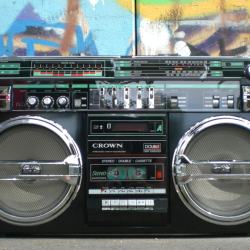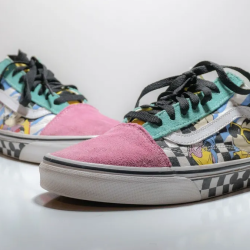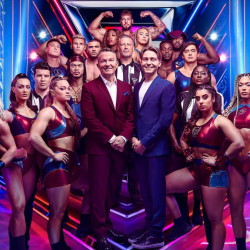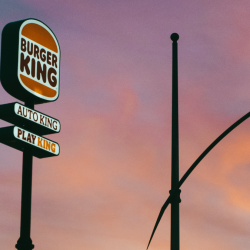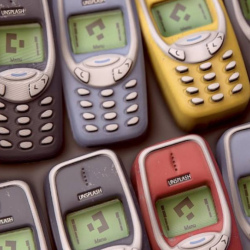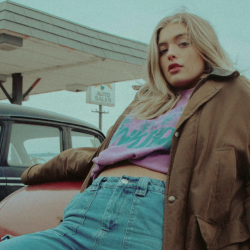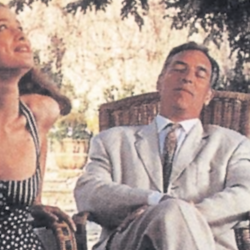In September 2023 youth charity The Prince’s Trust commissioned a study of 16-24-year-olds and their prospects; finding that one in three young people are lowering their professional ambition due to a lack of opportunity and uncertainty around the cost of living. Honestly, who can blame them? With the future characterised by war and the climate crisis the world looks more uncertain than ever. And it’s not just the future that feels unpredictable when even the price of our supermarket shop feels like a lottery. In this context, what seems most relevant to people is a need for predictability, reliability and stability in order to generate a sense of agency in life.
The wave of ’90s and ’00s nostalgia that we have seen in fashion and media (hello Juicy Couture, Uggs, Gladiators and Mean Girls) can be seen as an aesthetic trend, but it can also be seen as tool of cultural certainty. The longevity of this trend suggests that nostalgia for this period of time is providing more than a ‘look’. Rather, it transports us to a point in near history that even Gen Z can relate to, through reference points, celebrities, social media and charity shop finds, and is also a place that exists before the stressors that society is experiencing now.
The year 2000 was before Facebook, YouTube, Twitter and even MySpace, before 9/11, Al Gore’s An Inconvenient Truth (2006) and the 2008 banking crash; it was a time of relative security. Of course, the rose-tinted time machine we are viewing that era through is myopic, and minimises the problems of the day, but in a way, this allows us to actively re-craft a version of that time as a refuge — a cultural reference point used as an antidote to our present fears. We know how the ’90s plays out, it gives us certainty.
Predictability and smooth sailing is not only an emotional need, but a physical one as well. The new wave of mushroom derived supplementation that is sweeping my Instagram feed promises that Chaga, Lion’s Mane and Resihi will give us focus, calmness and banish brain fog. Whilst it’s possible to connect the increased use of mushrooms to a world of psychedelia, the main brand narratives and benefits touted are smooth, consistent, crash free energy — an alternative to the jittery boost of coffee.
Indeed, the benefit list of Spacegoods reads like an antidote to what society is plagued by: ‘jitters”, ‘crashes’, ‘anxiety’. It also reads as a list of things that undermine our sense of certainty.
We can also see the effects of this drive for certainty in the media we are consuming
I, like millions of other Brits, was gripped by series two of The Traitors. What made the series so compelling compared to other reality television formats, is that as the viewer, we are equipped with certainty. We know who the traitors are and we can see their machinations play out on screen — the wool is pulled over everyone’s eyes, except ours and we are left to cheer on heroes like Jazatha Christie and Saint Diane, willing them to have the certainty we do. It’s a genius format that both confirms our suspicions that someone out there is trying to get us, whilst giving us the vision to know where the threats are coming from.
The quest to equip ourselves with certainty in life is reflected in the changing way that we engage with platforms like TikTok. Their latest campaign, ‘It Starts on TikTok’ highlights the way that people are using the platform — as a search engine.
TikTok and adjacent platforms are awash with influencers showing us how things are done, breaking information down for an audience that are less interested in relying on traditional sources of authority, and more interested in someone showing us a recipe from their own kitchen, telling us how to stretch out our spines from their living room and showing us a cost breakdown of garden landscaping.
The how-to-ification of social media (an evolution of the ‘hack’) shows us how people are looking for guidance from peers to help provide a sense of certainty and reassurances that minimise risk of failure.
Brands that provide us with a sense of security in this context are relevant to people who cannot afford to be taking risks, to whom aspiration is to feel less jeopardy in life. Relevance in a time of insecurity is finding ways to create assurances for people, to ground people enough to enable them to grow. If The Prince’s Trust tells us that people are lowering their ambitions due to a lack of certainty over opportunities, then tools that allow us to build a sense of resilience, security and predictability are providing the guidance and assurances that allow people to dream once again.
Featured image: Unsplash























